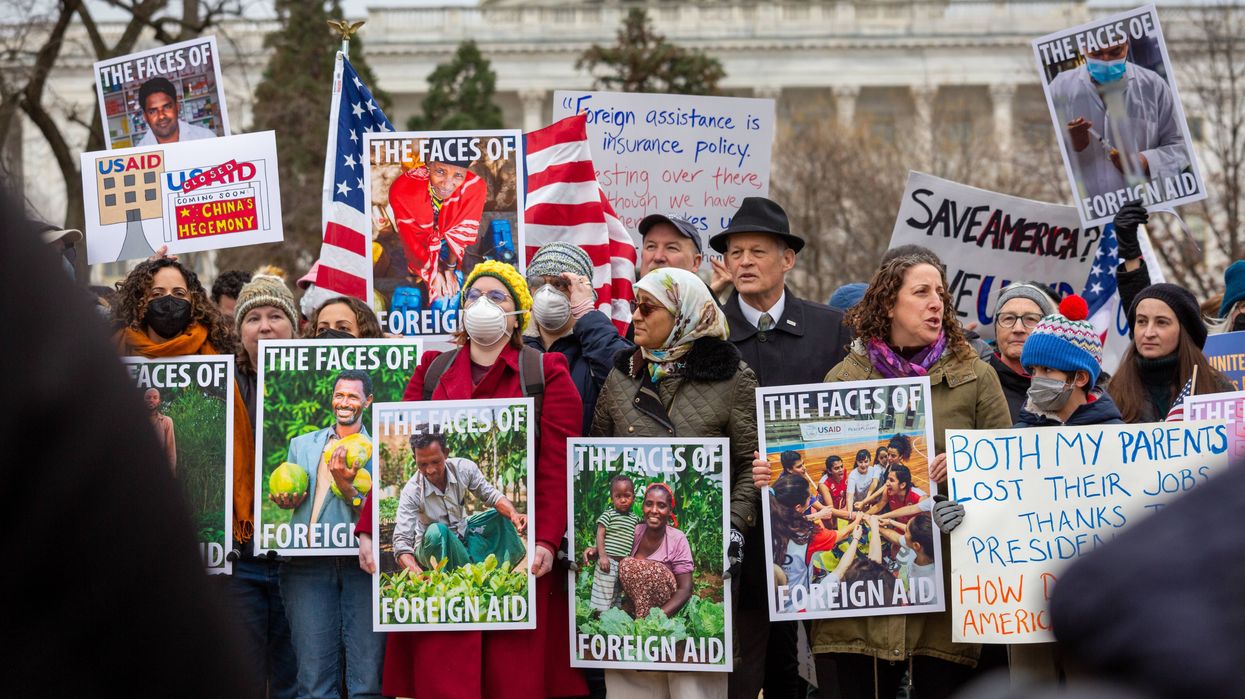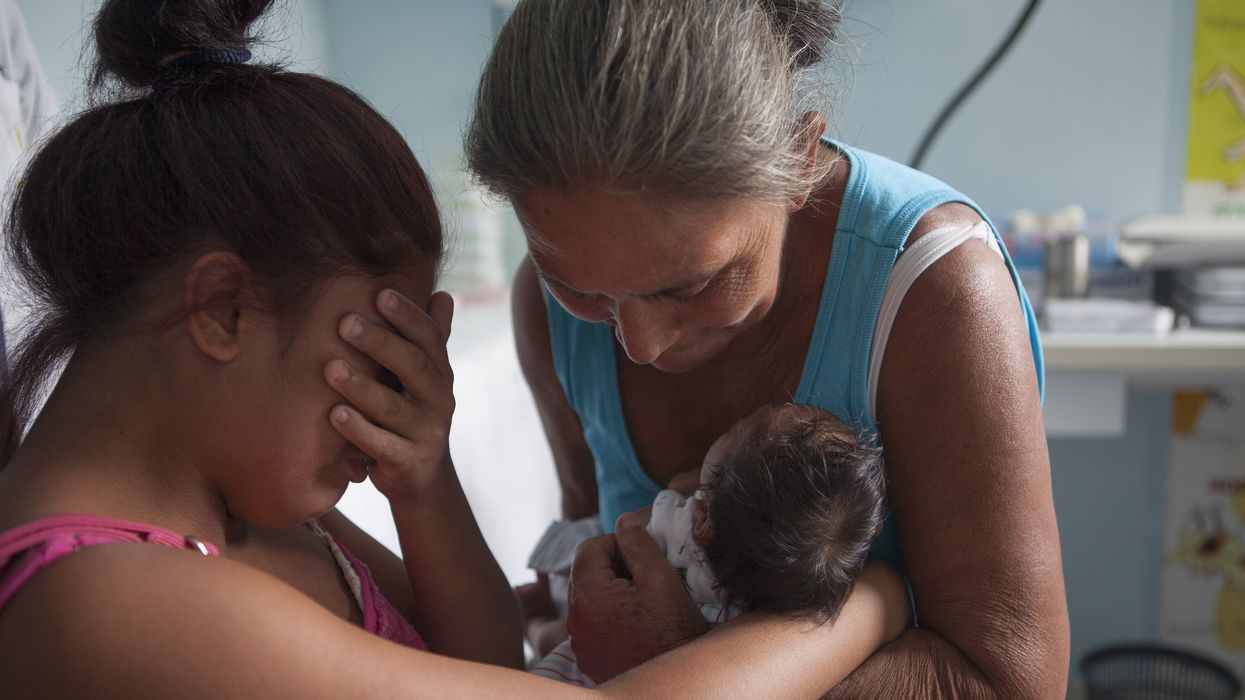“Radical leftists, grifters, and lunatics” are the labels that Elon Musk uses to describe people who worked for the United States Agency for International Development (USAID) or anyone who dares to speak up in favor of an agency that for over sixty years has embodied the democratic values this country aspires to live by. Most Americans, indeed, have no clue what foreign aid is, which makes it easy for this Administration to weaponize it and demonize USAID’s work.
For the record, I worked at USAID for three years as a senior communications advisor in the Bureau for Global Health. I was hired as a contractor under the Obama Administration and stayed for about 18 months into the first Trump Administration. Before joining USAID, I worked with organizations that implemented USAID’s programs and delivered humanitarian assistance in far-flung places. For seven years, I lived in Nairobi, Kenya, where I saw first-hand the impact of U.S. foreign assistance programs.
 USAID rally in Washington DC, one with Senator Cory Booker. Kelley Lynch
USAID rally in Washington DC, one with Senator Cory Booker. Kelley Lynch
So yes, I suppose Musk could label me—and thousands of aid workers like me—as leftists, grifters, or lunatics. But here’s the difference between us and Musk: we choose to work in foreign aid because we believe that every person, regardless of wealth or geography, has the right to live in peace, with dignity, and the opportunities to reach their full human potential. That means access to education, healthcare, and protection from intimidation and harm.
Is this really a “radical” idea?
The executive order to reevaluate and realign foreign assistance was among the first ones signed by President Trump on his inauguration day. On January 24, a Stop-Work Order targeting USAID was issued by Secretary of State Rubio. What started as a 90-day freeze on U.S. foreign aid programs, pending a review process has turned into a permanent shutdown of an Agency and an entire sector where the U.S. was a leader for six decades. This move leaves a ready-made power vacuum for China to step in.
The latest figures, as reported by Devex, suggest that USAID’s workforce was cut from 10,000 to 294 in just a week. USAID staff stationed in U.S. embassies were told to return home immediately, having to quickly pack up homes and pull kids abruptly out of school. USAID’s website, which contained a ton of useful data, went offline almost immediately, and its X account was removed. This was a deliberate purge meant to eradicate what Musk and President Trump perceive to be a “Marxist ideology.”
The disinformation Musk has spread since vowing to annihilate USAID is astonishing. On X, he called the agency “ criminal ” and said it was “time for it to die,” boasting that he spent the weekend “ feeding USAID into the woodchipper.” What I find most alarming is that he and other tech plutocrats now control our digital information landscape, using “freedom of expression” as a pretext to eliminate fact-checkers, amplify falsehoods, and discredit many dedicated government workers.
Shutting down USAID does not just impact the federal workforce, but it is definitely taking a major hit. It is also affecting thousands of people working for USAID’s implementing partners. They are the backbone of USAID, the “boots-on-the-ground,” those who work with local governments and civil society to strengthen health systems, boost agricultural productivity, harness innovation for research, or train media professionals to discern facts from fiction – just to name some USAID-funded activities.
Most importantly, the looming USAID shutdown is wreaking havoc in communities worldwide. People who depend on life-saving medicines for HIV, TB, and malaria are being turned away from health clinics. Clinical trials are abruptly stopping in South Africa, leaving people with no access to monitoring or care. Afghan girls will lose access to secret schools, their only hope to get an education under Taliban rule. An aid worker friend warned me that without USAID support, Burmese journalists in Thailand would be forced back to Burma, risking their lives.
To make matters worse, efforts to contain disease outbreaks—like Ebola, Mpox, or Bird flu—are suddenly defunded, putting American lives at risk. Let me break this down for you. During the Zika outbreak, I traveled to Honduras and Jamaica to document U.S. taxpayer-funded programs. These initiatives supported mothers of babies born with congenital Zika syndrome, trained community leaders on basic sanitation measures, strengthened lab capacity for disease surveillance, and partnered with U.S. companies to harness innovation. Infectious diseases don’t respect borders. The only way to contain them is by collaborating with other countries and investing in preparedness.
Watch Samantha Power’s video interview with Stephen Colbert on why we need USAID:
- YouTubewww.youtube.com
Let’s be clear: poverty and despair fuel radicalization, posing a threat to U.S. national security. USAID’s work, and that of its implementing partners, are the “soft power” of American diplomacy. By helping others, we help ourselves. When I lived in East Africa and visited refugee camps in Kenya and Sudan, I often saw large bags of food aid bearing the USAID logo with the tagline “from the American people.” In rural pharmacies, I encountered stacked boxes of medicines with USAID branding. I used to cringe when I saw that logo. Other donors are not as eager to publicize their gifts. But American generosity has brought us goodwill on the ground despite our sometimes-harmful foreign policy.
Experts question the legality of shutting down USAID, an agency created by Congress in 1961 under President John F. Kennedy. Lawsuits are being filed, but President Trump, eager to appease his base, is pushing ahead. After all, this is an easy target that feeds the MAGA narrative on “massive” spending of American taxpayer’s money abroad. The fact is that Congress sets USAID budget priorities, and the U.S. only spends about 0.7% of its federal budget on foreign assistance, far less than other G7 countries.
At the end of the day, foreign aid and humanitarian assistance are about understanding that uplifting others is not a zero-sum game. This is the “radical” concept that seems to be so threatening to one of the wealthiest men in the world and to this administration.
Beatrice Spadacini is a freelance journalist for the Fulcrum. Spadacini writes about social justice and public health.




















Trump & Hegseth gave Mark Kelly a huge 2028 gift